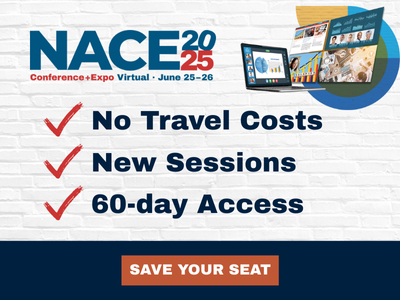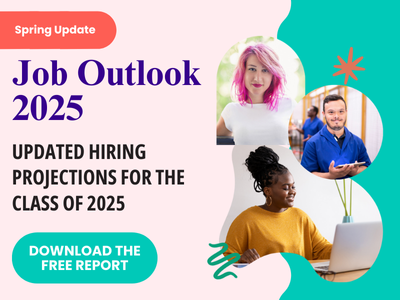NACE Journal, November 2020
For far too long, many of our career centers have approached career education as instruction into a presentation of who our students are on the outside so that they may be best prepared for how the world and the workplace are out there. We have come to a belief that God, life’s answers, and everything we need exists outside ourselves. Similarly, we have come to reduce professionalism to what we look like, to something that exists outside ourselves. Conversely, we tell our children that “it’s not what’s on the outside that matters, it’s what’s on the inside.” Yet, as soon as those kids are old enough to attend our universities and get a job, they quickly come to realize their place in the world is more concerned with their image than with who they are and who they are becoming.
For far too long, we have directed our students to conform to settler colonialist tools that impose socially dominant cultural norms as a means of fitting in.1 Colonialism involves stolen land and the imposition of religious and economic practices to civilize indigenous people. Indigenous children were torn from their family and tribe and shipped to boarding schools. They were stripped of their culture; indigenous languages, foods, dress, and ways were deemed inferior.
Looking Versus Being Professional
We have sought to professionalize the worker the way settlers sought to civilize the “savage.” The resume and cover letter, developing a brand to package and present ourselves, and dressing for success are little more than window dressing. The person on the other side of that table or monitor screen will never know all of who we are. In directing students to brand and commodify themselves, we have facilitated a performative approach to career services that emphasizes the part we play, the show we put on, and what it means to look professional, rather than what it means to be professional.
The National Association of Colleges and Employers (NACE) defines the professionalism/work ethic competency as:
“Demonstrate personal accountability and effective work habits, e.g., punctuality, working productively with others, and time workload management, and understand the impact of non-verbal communication on professional work image. The individual demonstrates integrity and ethical behavior, acts responsibly with the interests of the larger community in mind, and is able to learn from his/her mistakes.”2
This says nothing about how we look and how we dress; it speaks to experiences. Professionalism has become conflated with acting the part, fitting in, and conforming to dominant cultural norms. However, those who are so concerned with the bottom line that they are willing to compromise values for self-gain through, for example, illegal insider trading, defamation of a competitor, or manipulating accounts and mistreating employees, are not professional, regardless of whether their belt matches the color of their wingtip shoes. Professionalism is how we are in relationship to others, how we share our humanity and receive that of others.
Why are we surprised that first-generation college students visit our career centers at lower rates?3 Perpetuating social dominant cultural norms is the definition of how marginalized identities are minoritized. It is exactly why imposter syndrome is so common among students with marginalized identities—they believe that they are not enough and that they don’t belong. By advancing the expectation that they shake hands a certain way, speak a certain way, and dress a certain way, we fail to guide students in the discovery of who they are as we prepare students for how the world is, rather than help them imagine how it might be. Yet we fail miserably at that, too. Even if we haven’t explicitly instructed students to code switch, the message is clear: Assimilate. For too long, professionals in career education have shied away from the intersection of career education and diversity, equity, and inclusion (DEI). We have approached DEI as “their job” for too long, when it should have been all of our jobs all along.
The Value Students Bring
Fifteen years ago, Tara Yosso wrote about the value of who our students are, where they come from, and the cultural value they bring.4 That value, of course, was always there. Like white privilege and white supremacy, we only began to realize it after George Floyd stopped breathing and after the ensuing social unrest created a massive movement of white people examining and coming to terms with white privilege and white supremacy. A tipping point of sorts. For the first time, many finally have come to realize how so many of our institutions, including most of our career centers and universities, have been built on, in, and around racist systems and structures. We have begun to examine how our career centers have perpetuated dominant cultural norms—whiteness, patriarchy, and heteronormativity. Fewer of us have come to realize, however, that tailoring services that serve students with marginalized identities is a matter of serving the majority of our students, who have at least one minoritized identity. In doing so, we embrace our shared humanity and what makes us unique. We are realizing that it is not just about celebrating diversity, but realizing how our students with marginalized identities often have overcome significant adversity. This ability to turn lemons into lemonade and make four quarters stretch for what seems like forever is a skill. On the streets, we call it the hustle. It is in meeting rooms and boardrooms, too.
The common denominator of Me Too, Occupy, Black Lives Matter, and virtually all other social movements is realizing the very simple truth that women, poor people, and Black people are human. Period. That’s it.
Activism is a response to the inequity and the failure of human beings to recognize their humanity. Activism is in response to suffering. COVID-19 is exposing the inequity of the suffering.
It is why the Oregon State University (OSU) Career Development Center coordinated a group career counseling session with OSU counseling and psychological services. Students, like many of us, are experiencing anxiety about the future. Many of them are socially distant and isolated, and the return on their investment, the return on their degree from a social mobility, strictly financial measurement, hasn’t been fully realized at the moment.
Suffering is very real. We are in the midst of a pandemic that has spurred a medical and economic crisis, and accentuated a 400-year-old crisis with racial injustice. Yet all of this turmoil is centered around just one profound and deeper crisis: a spiritual crisis.
There has and always will be suffering. It is our resolve and our response to the suffering that is aided and abetted by our spirituality. We must initiate a paradigm shift that energizes a more radical intellectual engagement of existence, inner consciousness, and global coexistence. Career centers are surprisingly well positioned to facilitate this paradigm shift on our campuses. Approaching students as their holistic selves requires embracing and realizing that the connections between mind, body, and soul lead to an appreciation for the interconnections between us all.
Approaching Career Learning With a Spiritual Lens
My value proposition for approaching career learning from a spiritual lens is this: We are already doing spiritual work; we just don’t think of it as such. It is the inner viewing we help our students do to prepare for the interview to reframe their experiences in much the same way as we reframe our emotions. Through awareness and reflection, we can change the angle from which we see things. We get students to believe and have a renewed faith in themselves. We guide our students in the exploration of values and what brings them meaning and purpose. We guide our students in the discovery of their “why” and explore their passions, those that ignite and light the fire within them. I call this “soul force.” In his “I Have a Dream” speech,” Dr. King noted that, “We shall match your capacity to inflict suffering by our capacity to endure suffering. We shall meet your physical force with soul force."5
It is an inner strength guided by a search for an inner truth. Career coaches help students sift through and discover this inner light. Connections with alumni build networks upon foundations of relationships where we are in communion with one another. When we approach our work as spiritual, our work becomes our calling. It becomes our personal and professional ministry and allows us to align with what Parker Palmer refers to as the “role and soul.”6 This is not evangelicalism. I work at a public institution and adamantly agree with our framers that all of us “shall be free to profess, and by argument to maintain, their opinion in matters of religion.” This is advocacy not for faith, but in faith that we may come to appreciate the real meaning of the separation of church and state: “The concept of a ‘separation of church and state’ reinforces the legal right of a free people to freely live their faith, even in public; without fear of government coercion. Free exercise means you may have a faith and you may live it.”7
Pronouncing the oneness that unites us as the trunk of the tree connects all branches, leaves, and fruit is not an effort to proselytize but a matter of living out a belief that we are each connected. You must not change who you are, only consider who you are becoming. When we believe in ourselves and believe there is something bigger than ourselves that we’re a part of, whether that is a God, an organization, or a calling, something changes. Something awakens within us and in how we connect with each other—employers, campus stakeholders, colleagues, and the students we serve.
At OSU’s 150th commencement, Rani Borkar, the chair of OSU’s Board of Trustees, told the 2019 graduating class, “It is important to know what you believe in, your self-identity and your value system. These are the foundations of a purposeful life and your anchors in a changing world.” She said this at the commencement celebration of a comprehensive, research-intensive public land-grant university. Borkar’s remarks characterize the importance of religious, secular, and spiritual identity as the foundation of purpose and meaning-making. These musings are surprisingly in alignment with what I regard as a spiritual OSU vision statement for 2030 that reads, “Oregon State University seeks to develop graduates who are able to address complex issues from not only an intellectual paradigm but also with compassion, integrity and a universal responsibility towards interconnectedness, leadership and global citizenship.”
Human Skills
Students are expected to leave college as better human beings and to graduate with a greater sense of their individual talents, values, and commitments that will give their lives meaning, allow them to contribute to society as leaders and citizens, and put into practice the knowledge and skills to implement a fulfilling life.8, 9 This underscores what should be the very mission of our career centers and institutions of higher learning.
As true as this may be, parents and their students rightfully expect a return on their investment, too. This is often measured in jobs and salaries. In the process of learning how to get a job, we teach students to translate their soft skills. Here, we make the same mistake as our students who fail to communicate their transferrable skills.
NACE’s career readiness competencies reflect the skills employers value most among college students, including critical thinking, teamwork and collaboration, creativity and innovation, leadership, and problem-solving. These are not soft skills. They are human skills; they are what make us human.
Yes, the “hard” skills—how we work with machines, codes, and robots, for example—matter very much. However, employers also want to know how we work with and lead other human beings. That is what makes us leaders. More importantly, it is what makes us human.
Many of the jobs that will exist in 10 years do not exist now.10 Although mass layoffs during the pandemic have not been the direct result of artificial intelligence, the Zoom meetings, social distancing, and virtual reality we have been forced to adapt to mirror many of the anticipated impacts of automation. Robots and artificial intelligence will force industries to change.
So we must change. Those who refuse will not survive and will be left behind. Our students may be increasingly expected to work jobs where they will have to differentiate themselves not just from humans, but also from robots.
We help students realize what makes them human; we implore them to meditate on their past and realize a heightened level of self-awareness so that they may reframe their skills and where they have been and what, why, and how they did it. The same way they may reframe their emotions, through self-awareness, they reframe experiences, connecting accomplishments, the setbacks they overcame, and the obstacles they overcame.
My commitment to my students and my calling is centered in spirituality. My life’s work is our students’ spiritual growth:
- To develop increased self-awareness, values and beliefs, emotional intelligence, social responsibility, morality, and resiliency to thrive in the face of challenges;
- To have an improved perception of self in relation to others and a community and a sense of belonging;
- To become responsible and engaged global citizens, soulful leaders, and authentic beings;
- To participate in “inner work” through self-reflection and contemplation; and
- To cultivate a commitment to the common good, and consider the influence of their religious, secular, and spiritual identity on their contributions to a better world as engaged citizens and change agents.
Endnotes
1 Stoll, Jonathan (2020, May 20). “Career Centers Serve the Majority and Civilize the Minority,” LinkedIn. Retrieved from https://www.linkedin.com/pulse/career-centers-serve-majority-civilize-minority-jonathan-stoll/.
2 National Association of Colleges and Employers (n.d.). Career readiness defined. Retrieved from https://www.naceweb.org/career-readiness/competencies/career-readiness-defined/.
3 Association of American Colleges & Universities (2017, March). “Facts & Figures—University Graduates’ Experiences With Career Services, Mentorships, and Diversity,” AAC&U News. Retrieved from https://www.aacu.org/aacu-news/newsletter/facts-figures-university-graduates-experiences-career-services-mentorships.
4 Yosso, Tara. (2005). “Whose Culture Has Capital? A Critical Race Theory Discussion of Community Cultural Wealth,” Race Ethnicity and Education, 8:1, 69-91, DOI: 10.1080/1361332052000341006. Retrieved from https://doi.org/10.1080/1361332052000341006.
5 King, Martin Luther, Jr. (1963, August 29). Speech: I Have a Dream. Retrieved from https://www.americanrhetoric.com/speeches/mlkihaveadream.htm.
6 “Connecting ‘Soul and Role’ Critical, Parker Palmer Says in Mendenhall Lecture,” (2002, February 14). Retrieved from https://www.depauw.edu/news-media/latest-news/details/11910/
7 Lankford, James, and Moore, Russell. (2018, January 16). “The Real Meaning of the Separation of Church and State,” Time. Retrieved from https://time.com/5103677/church-state-separation-religious-freedom/.
8 Astin, Alexander. (Spring 2004). “Why Spirituality Deserves a Central Place in Liberal Education.” Liberal Education, 34-41 Retrieved from http://scholar.google.com/scholar_url?url=https://files.eric.ed.gov/fulltext/EJ682573.pdf&hl=en&sa=X&ei=q4GHX_a_IsOsywTUsouIBw&scisig=AAGBfm1vHGzf3gkE95ETKfVmNhvgzKWdRg&nossl=1&oi=scholarr.
9 Chickering, Arthur; Dalton, Jon; and Stamm, Liesa. (October 2005). Encouraging Authenticity and Spirituality in Higher Education. John Wiley & Sons, Inc.
10 Tencer, Daniel. (2017, July 14). “85% of Jobs That Will Exist in 2030 Haven’t Been Invented Yet: Dell,” Huffington Post. Retrieved from https://www.huffingtonpost.ca/2017/07/14/85-of-jobs-that-will-exist-in-2030-haven-t-been-invented-yet-d_a_23030098/.







